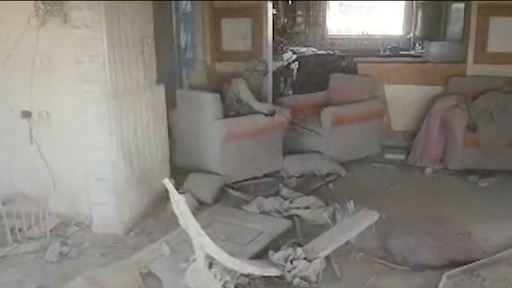
Yahya Sinwar, the prominent leader of Hamas and a key architect of the October 7, 2023, attack that ignited the most intense conflict seen in the Israeli-Palestinian struggle, has been killed by Israeli forces in Gaza at the age of 61.
Sinwar was a pivotal figure in shaping the war’s direction, known for his fierce determination, disciplined approach, and authoritarian leadership. Having spent years in Israeli prisons, he learned Hebrew and gained a deep understanding of his adversary. His efforts were directed towards re-establishing Hamas’ ties with the Iran-led coalition after a rift that followed the onset of the Syrian conflict in 2011.
The announcement of his death came after what Israeli officials described as a spontaneous confrontation with their troops on a Wednesday. On Thursday, the Israeli military confirmed that Sinwar had been killed, with a senior official from Hamas corroborating this the following day.
Sinwar masterminded the surprise assault on October 7, teaming up with the elusive Mohammed Deif, who leads Hamas’ military branch. Israel had previously claimed that Deif was killed in a July airstrike that resulted in numerous Palestinian casualties, including over 70 deaths.
Shortly after Sinwar’s rise in leadership, Hamas’ exiled leader Ismail Haniyeh was killed in an explosion during a visit to Iran, an event Israel was blamed for. Sinwar subsequently took charge of Hamas while remaining in a concealed location in Gaza.
The October attack resulted in the deaths of approximately 1,200 individuals, most of whom were civilians, alongside the abduction of about 250 others, catching the Israeli military and intelligence apparatus completely off guard and dismantling the perception of Israeli invulnerability.
Israel’s response was devastating, leading to over 42,000 Palestinian casualties, as reported by local health authorities who do not differentiate between fighters and civilians. This conflict also led to extensive destruction in Gaza, leaving countless people homeless and many facing imminent starvation.
Throughout the conflict, Sinwar endeavored to engage in indirect negotiations with Israeli officials, aiming to secure the release of thousands of Palestinian detainees in Israeli jails, reminiscent of the deal that led to his own release over a decade prior.
The war he incited drew Hezbollah into the fray, ultimately causing a renewed Israeli incursion into Lebanon and resulting in direct military exchanges between Iran and Israel, escalating worries of a broader conflict in the region.
Sinwar was viewed as a daunting figure by Israelis, with Rear Adm. Daniel Hagari, the chief spokesperson for the Israeli army, labeling him a murderer and asserting that Hamas is more dangerous than ISIS.
Sinwar’s defiant nature was evident when he concluded one of his rare public addresses by inviting Israel to attempt an assassination, confidently walking back to his home after the speech, engaging with locals during the stroll.
Among Palestinians, he garnered respect for his commitment to resisting Israel while living in impoverished Gaza, contrasting with other Hamas leaders who resided more comfortably abroad.
Despite this respect, he instilled fear among Gaza’s populace due to his authoritarian rule, suppressing any expressions of dissent. Unlike other Hamas leaders, Sinwar did not craft a public persona, earning the nickname “Butcher of Khan Younis” for his harsh response to Palestinians suspected of collaboration with Israel.
Sinwar was born in 1962 in the Khan Younis refugee camp in Gaza, his family having been among the many displaced during the 1948 war associated with Israel’s establishment.
As an early member of Hamas, which emerged from the Palestinian branch of the Muslim Brotherhood in 1987 during Israel’s military occupation of the coastal enclave, he convinced Sheikh Ahmed Yassin, Hamas’ founder, of the necessity to purge the organization of informants. This led to the establishment of a security body, known as Majd, which he led.
Arrested in the late 1980s, Sinwar confessed during his interrogation to killing 12 suspected informants and was sentenced to multiple life terms for offenses including the abduction and murder of two Israeli soldiers.
Michael Koubi, a former head of investigations at Israel’s Shin Bet security agency, recalled one chilling confession in which Sinwar described making a man bury his brother alive under suspicion of being an informant. Koubi noted Sinwar’s eyes sparkled with pleasure as he recounted this incident.
Sinwar, however, was seen as charismatic and sociable by fellow inmates, working diligently through his leadership in prison to improve conditions for Hamas members. Ensuring inclusivity among various political factions, he developed a reputation that was respected among prisoners, while also learning Hebrew and studying Israeli society intently.
He became a prominent figure among imprisoned Hamas members, known for organizing protests against their conditions. Sinwar also indulged his fellow prisoners by making kunafa, a popular dessert.
Anwar Yassine, a Lebanese national who spent a considerable period in Israeli detention alongside Sinwar, testified to the leader’s understanding and respect for different political ideologies.
During his incarceration, Sinwar authored a 240-page novel titled “Thistle and the Cloves,” chronicling Palestinian society from the 1967 Middle Eastern war through to the onset of the Second Intifada in 2000.
After battling aggressive brain cancer and receiving treatment in a Tel Aviv hospital, he was released in 2011 as part of a prisoner exchange deal for Gilad Schalit, an Israeli soldier held by Hamas. This decision prompted severe criticism of Prime Minister Benjamin Netanyahu for setting free numerous prisoners who had committed deadly attacks.
Upon returning to Gaza, Sinwar played an integral role in synergizing Hamas’ political leaders with its military wing, the Qassam Brigades, while simultaneously consolidating his reputation for ruthlessness. He was widely believed to have orchestrated the unprecedented killing of a rival Hamas commander in 2016 during noted internal power struggles.
Sinwar later embarked on marital life following his release, and in 2017, he ascended to the role of head of Hamas’ political bureau in Gaza, fostering stronger ties with Iran and its allies, including Hezbollah, while concentrating on fortifying Hamas’ military capabilities.
